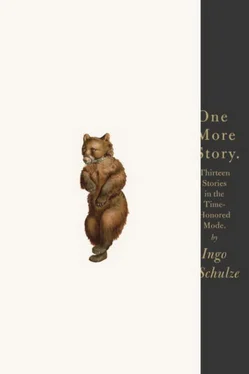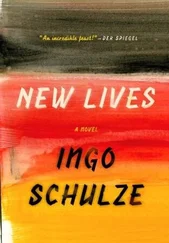By the time we handed over the keys to the Epos Room to Arne the next morning, thanking him and saying our goodbyes, the Finns had already departed — in two taxis, Mika riding with his boss, whereas the towhead had to pay for his own taxi. Arne considered this a victory for Mika. Because, according to Arne, the open hostility that had erupted as a result of the hunting rivalry between the boss and his former right-hand man offered Mika a second chance, so that the bear hunt had paid off for him after all, if in unexpected ways. The woman gathering berries, Arne hoped, had received enough hush money. But if she still couldn’t keep her mouth shut, which he feared would be the case, her punishment would be that no one would believe her story.
Arne promised to let us know as soon as he learned anything about Seryosha’s fate. Sad to say, I’ve never heard another word from Arne.
Of course I ask myself why, after six years, I’m now writing about that memorable hunt. I’ve forgotten so many details in the meantime — from the names of the lyric poets at the writers’ retreat to the make of our rental car, from exact prices to the route we took, and so on and so on. Besides which it’s quite possible that things have changed drastically in Estonia over the last few years, so that my story has in some sense become past history. In any case, the fact is that not only my own life has changed. All our lives have taken a different course over the last few years. And that may perhaps — perhaps — be the reason I finally found myself in a position to venture a story about Estonia.
“You picked up something while you where down there,” the doctor on emergency house call offered as a diagnosis. While the air drained from the blood-pressure cuff, he added, “Or it was already budding inside you.” I’m quite certain he used the word “budding,” although that sounds so metaphorical. At any rate, since my return on March 1st I had been lying in bed for two weeks — totally sapped of my strength, gulping down antibiotics, and expecting my head to burst the moment I attempted so much as an e-mail. My recovery was so slow that even in April I still had to be sparing of my energies.
Once we had landed at Tegel, I told Sheila I didn’t want to see her again. I said it even though between flights in Paris — where the drafty jet bridge had finished me off — she had bought a dark-skinned doll for my daughter, Anne, since I’d been unable to find a “brown” doll in either Cairo or Alexandria.
Sheila said that I shouldn’t act so childish, she would take care of me, and after I was healthy again, we could discuss the whole thing. My jealousy at any rate was as foolish as it was unfounded.
We could talk about it again at some point, I said, handing the cabdriver my suitcase, but first I wanted to get well, and having her around would be simply toxic.
I hadn’t intended to insult Sheila, but I wouldn’t have gotten rid of her otherwise.
I mention my illness and separation from Sheila because if I don’t, no one will understand why I didn’t give a thought to the incident in Cairo for quite some time, let alone tell anyone about it.
From a psychological viewpoint it’s easy to explain. My memory waited until I had recuperated and halfway overcome the separation from Sheila. At that point I began to talk about it, because I thought telling the story would help objectify it. By now I’ve told it often, quite often, blaming myself, admitting my guilt — all of which provides only short-term relief.
My story is about the next-to-last evening, when I joined Hoda and the other women to dine on squab or, far better, “pigeon”—for my sake we all had to speak English — and what a far more apt word “pigeon” is than the German Taube , because when you say “pigeon” you can literally feel the swollen, rubbery consistency of a stuffed squab as your lips touch it right before that first bite. I’ve never spent much time describing our little gathering, or the women, whom most locals took to be Christians since they were in European clothes, but who spoke Arabic. I’ve also never mentioned the vendors, the deaf-mute fortune-teller, the children, and a heavily made-up girl of thirteen or fourteen.
That evening, the whole absurd conference, the readings, my illness, the virus slinking its way inside me — it all probably belongs in the story, as well as a restaurant called the Fish Market and the fishermen in the harbor basin of Alexandria. I’ve never described the cabdriver, who was at least as much to blame as I was. But what good does it do me to cast aspersions on the cabbie? Above all I’ve never told about Sheila, about Sheila and Samir and the previous days.
By that next-to-last evening I was sick, tired, wounded — I wanted to get back to the hotel, I didn’t want to keep giving alms to beggars over and over, I wanted the cabdriver to finally pull away. But he took his time, chewing on his falafel. Luckily the cab doors were locked — a child to my left, a child to my right, children in a great swarm all around us, growing more and more brazen, spitting on the windshield — and then that loud bang as the taxi pulled away, as if they had all kicked it at once. The children were behind us now. The taxi zipped out onto the main road, I can’t say if we were doing thirty miles an hour or fifty or more. As far as I was concerned it couldn’t be too fast. And then, at some point, I see him, the boy, close to my shoulder, his eyes looking directly into mine, just a few inches away, wide-open eyes staring at me through the back windshield — with him hanging on my neck, so to speak. I don’t want him there, I want him to finally leave me in peace, I turn around again, look straight ahead.
It began, if it ever had something like a beginning, with a call in September or October 2004. The country code in the telephone display meant nothing to me. A deep female voice whispered: “We want to send you a fax.” At first I thought it was a call from Kiev, the accent was a match for that of a Russian or Ukrainian, because in early March I was supposed to tour Ukraine for a week. When I saw the page that came out of the fax machine, I had to laugh, and I mean a real guffaw. It annoys me now that I laughed, but at the time I found it completely absurd for someone to send me a fax in Arabic. What was I supposed to make of that calligraphy? At the bottom, however, I discovered an address written in tiny roman type.
I showed Sheila the fax, Sheila can manage a little Arabic, and with the help of a dictionary she finally figured it out.
“The purpose of this correspondence,” she said, “is to extend to you a very honorable invitation to an international writers’ conference.” Those were in fact her pathos-laden words. I was being invited to Cairo to deliver an address on “Literature and History,” flight and accommodations paid for by the organizers.
It was clear to me that I ought not accept any more invitations. For a year and a half I had been living off an advance and debts. I needed finally to finish the new book, and there was that trip to Ukraine besides.
My guess was that Gamal al-Ghitani and Edwar al-Charrat were behind the invitation. I didn’t want to disappoint them. But most of all I did it for Sheila. Sheila said it had always been a dream of hers to see Egypt.
Sheila’s father is Algerian, her mother comes from Kamenz near Dresden, the same town where Lessing was born. Sheila’s parents had both studied at the Technical University in Dresden. Sheila knows her father only from photographs. Sheila and I had met toward the end of 2003 at a reading in Koblenz. She had joined us afterward for dinner and, along with the bookstore owner, had accompanied me back to my hotel. Might she see my room and its view of the Rhine? she asked, as I was about to say good night. I had in fact enthusiastically recommended the view earlier.
Читать дальше












